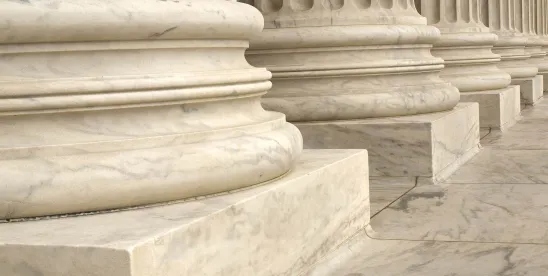In its first merits decision this term, the Supreme Court provided a straightforward application of textualism to demonstrate that in cases challenging administrative action under the Administrative Procedure Act (APA), Congress’s delegation of authority to the agency must be clear.
Only in this case, Congress got it right. In future challenges to agency action, counsel and affected parties should take into account the ability of Congress to limit those challenges.
A Unanimous SCOTUS Analysis
As we summarized previously, a unanimous U.S. Supreme Court (per Jackson, J.) held in Bouarfa v. Mayorkas that the revocation of an approved visa petition under 8 U.S.C. §1155 by the Secretary of Homeland Security (the “Secretary”) is the kind of discretionary decision that falls within the agency’s purview pursuant to authority that is delegated by Congress. In this case, the Secretary revoked a visa based on a sham-marriage determination, relying on the language of Section 1155 that grants broad authority to the Secretary to revoke an approved visa petition at any time, for “what he deems to be good and sufficient cause.” The revocation was challenged through the agency and then federal courts. At each turn, the agency’s determination was upheld, with the District Court and the Court of Appeals for the Eleventh Circuit both holding that, in the context of enacted legislation outlining the agency’s powers, courts are precluded from reviewing the Secretary’s decision.
These decisions focused on the language in 8 U.S.C. §1252(a)(2)(B)(ii) that strips federal courts of jurisdiction to review certain actions “in the discretion of” the agency. In Bouarfa, the Supreme Court held that Section 1155 is a “quintessential grant of discretion,” and such broad grant of authority “fairly exudes deference” to the Secretary. The Court further stated that, “[n]othing in the statute’s text or context limits the Secretary’s discretion in this way.” Despite the general presumption that administrative action is subject to judicial review, in this statute Congress expressed an unambiguous desire to preclude judicial review of the Secretary’s discretionary revocation of an approved visa petition. Because the statute is clear on its face, the presumption of judicial review of administrative action was “overcome by clear and convincing evidence.” The Supreme Court affirmed the decisions of the district court and the Eleventh Circuit by holding that judicial review of the agency’s revocation in this case is statutorily barred.
Implications for Agency Challenges
Despite the fervor for challenging administrative action in the post-Chevron world, this case reminds us that there are limits when Congress has enacted a clear delegation of authority to an agency and precluded review. For good reason, recent cases tend to focus on the ambiguity of statutes and instances where Congress has failed to legislate without clarity and completeness. In Bouarfa, the Court provides an easy and straightforward analysis of statutory interpretation where the text clearly seeks to foreclose judicial review of agency action.
The Court goes one step further in this short opinion to confirm that context matters. Indeed, textualists have few tools they can use in interpreting statutes, but context is one that helps demonstrate the difference in the protection Congress afforded to the agency in this case. As Justice Jackson wrote, “Congress did not impose specific criteria or conditions limiting this authority, nor did it prescribe how or when the Secretary must act.” Because Congress did not want to open up a new source of litigation, the agency’s discretion under §1155 is protected from judicial review.
This straightforward opinion helps clarify some of the uncertainty created by the Loper Bright decision in future challenges to agency action. Counsel and affected parties will need to distinguish Bouarfa to help support arguments that Congress did not clearly preclude judicial review or that its delegation of authority to an agency was ambiguous.
In sum, while the Bouarfa opinion didn’t create headlines, it can serve as a guardrail for lower courts charged with interpreting a statute in litigation challenging administrative action. To be persuasive, counsel challenging an agency action will need to evaluate whether their case survives an analysis under Bouarfa.






 />i
/>i
